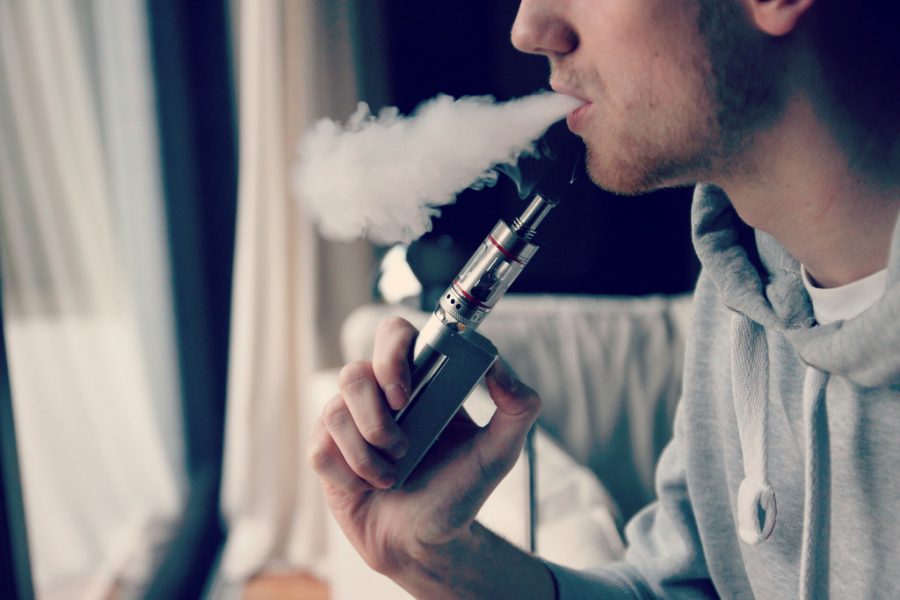The FDA’s E-Cigarette Ban Should Enforce All Nicotine Products
Opinion
December 19, 2018
Their gases seem to pervade every school’s bathrooms, defying the laws that restrict their use. While they may not include tobacco, the underage use of e-cigarettes is now classified as an epidemic. But despite what they may be today, e-cigarettes were first invented in 2003 as a way for addicts to wean themselves off of lung-damaging, carcinogenic traditional cigarettes. After much discussion and research, studies revealed the truth about smoking tobacco, and the electronic version was eventually accepted as a harmless alternative that allowed troubled addicts to satisfy their physical needs for nicotine without destroying their lungs.
Now, some people still use e-cigarettes or vapes to avoid those dangers. However, many others use vapes as a gateway drug to real cigarettes instead. A user will begin with the fruity, nicotine-free pods and may eventually try to experiment with “just a little” nicotine. Since the amounts of nicotine in JUUL pods is equal to the amount of nicotine in a pack of cigarettes, they will likely get hooked quickly. Even if they never move on to actual smoking, nicotine itself is far from harmless. It can seriously affect the development of the brain, especially in younger users. JUUL products should not be used by anyone who has not smoked before and should only be used in an effort to decrease smoking for those that have.
Yet that ideal world is clearly not the one we live in. The use of e-cigarettes actually goes down as people get older and according to a study by Truth Initiative, 11.7% of teens use them. The Food and Drug Administration (FDA) has recently decided to take action against this growing issue and outlaw the sale of certain JUUL pods in small stores that anyone can enter, such as gas stations. To discourage younger users, they focused on banning teen favorites such as mango and fruit medley.
This was a bold move by the FDA and the idea does have good intentions. In theory, it will shut down underage use of JUUL products and make them a positive influence rather than a corrupting one. Though it may prevent more people from starting to use JUULs, the effect of the law could actually be negative on those that have already begun. Nicotine is a powerful physical addictive that gives the body a need that can only be satiated by one thing: itself. Anyone who has already begun to depend on it simply can’t stop at will. Therefore, those people may gravitate towards using the other flavors or even actual cigarettes to fill the niche.
For that matter, why is the FDA taking action against vapes rather than tobacco cigarettes? As unhealthy as e-cigarettes can be, they are nothing compared to the traditional kind, yet there are absolutely no restrictions placed on where tobacco can be sold. I understand that this attack on JUUL is designed to cut off the e-cigarette industry in order to protect younger generations. But what are they really protecting the youth from? They are taking the indirect path to preventing smoking in the hope that it will result in less backlash now and pay off down the line. However, sometimes it is necessary to be bold. I am in no way suggesting a complete ban on cigarettes, but they could surely put some limitations on the stores in which they can be sold (as they have done for e-cigarettes). Instead of removing e-cigarettes to force people to turn to tobacco, we should limit tobacco and e-cigarettes. The only reason this no-brainer action hasn’t already occurred is the money involved. Big tobacco companies pay a fortune each year to the government in order to keep their products unrestricted. Nevertheless, if the FDA wanted to do what was best for the people of this country, it would reject that dirty money and place some restrictions on tobacco, the real problem.
Underage vaping is a major issue throughout the U.S. from school bathrooms to household use. The FDA is right to make a move against the industry, but there are also better things it could be doing like regulating food production or actually limiting tobacco sales. Though this new law works in theory, it has a positive effect, if any, on cigarettes, the intended victim.




Keith Brandons • Jan 11, 2019 at 3:07 pm
Listen Vikram, your a great guy but your stance on vaping seems a little skewed. Judging by your word choice, it is easy to see that you have been payed off to write this article. Vaping is a great way for us students to cope with school stress. It also is a fun hobby to make cool vapor tricks (not to flex but I blow fat clouds). My mom tells me that vaping is a good replacement for smoking, and sometimes she lends me hers. My only complaint is they got rid of mango flavored. That was the bomb man. Truly this is written by a sheltered child that never vaped that was payed $5 by the anti vaping society to bash on my favorite pass time. Next thing you’d say is that marijuana is unhealthy for teens. Unbelievable. 1/5 stars on yelp.